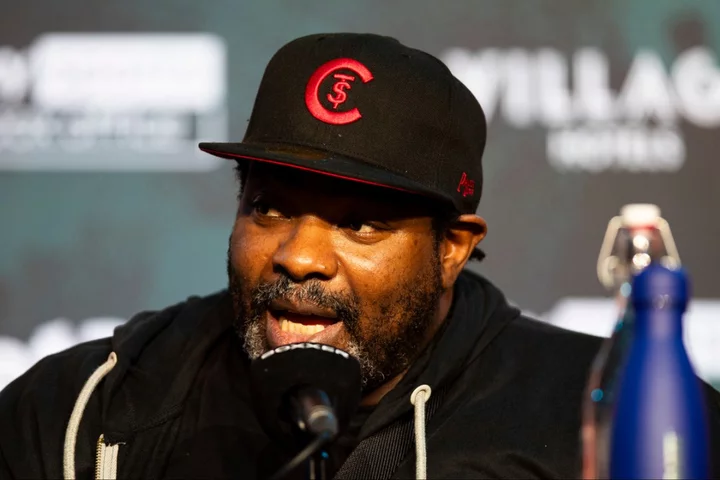
Chris Eubank Jr’s coach remanded in custody following airport arrest
Chris Eubank Jr’s coach has been charged following his arrest at Manchester Airport on Sunday, when a gun was found in his suitcase. Brian “BoMac” McIntyre, who guided Eubank Jr to a stoppage win over Liam Smith on Saturday, was detained by armed police after a scan of his checked-in luggage revealed the presence of a firearm and ammunition. The American, 53, was due to fly from Manchester – where Eubank Jr beat Smith at the AO Arena – to Atlanta in the United States. A statement from Greater Manchester Police on Monday read: “At around 10.45 am on Sunday 3 September 2023, officers were called to reports of a possible firearm being found in hold luggage by airport staff at Manchester Airport. After initial inspection by security staff, GMP officers attended, and the firearm was seized. Subsequently, a man has been arrested for possession of a firearm and remains in custody for further questioning.” A follow-up statement on Tuesday read: “Brian McIntyre (01/07/1970) from the United States of America was charged with possession of a firearm and possession of ammunition for a firearm without a certificate. “McIntyre attended Stockport Magistrates court this morning where he was further remanded into custody. He is next due to appear at Manchester Crown Court on Monday, 9 October 2023.” Greater Manchester Police confirmed to The Independent that McIntyre will remain in custody until that date, when a plea will be entered. Eubank Jr’s win against Smith, which came eight months after the latter beat Eubank Jr via TKO, marked McIntyre’s first time teaming with the Brighton middleweight. Former boxer McIntyre also coaches Terence Crawford, who is seen by many as the No 1 pound-for-pound boxer in the world. The unbeaten Crawford produced a masterclass against Errol Spence Jr in July, handing his fellow American his first professional loss to become undisputed welterweight champion. The southpaws are expected to clash again later this year or early next year, after Spence Jr triggered a rematch clause last week. Read More Chris Eubank Jr banishes demons by stopping Liam Smith to cap off slick showing Chris Eubank Jr salvages career on night of sweetest revenge Punch stats highlight Chris Eubank Jr’s dominance in Liam Smith rematch
1970-01-01 08:00
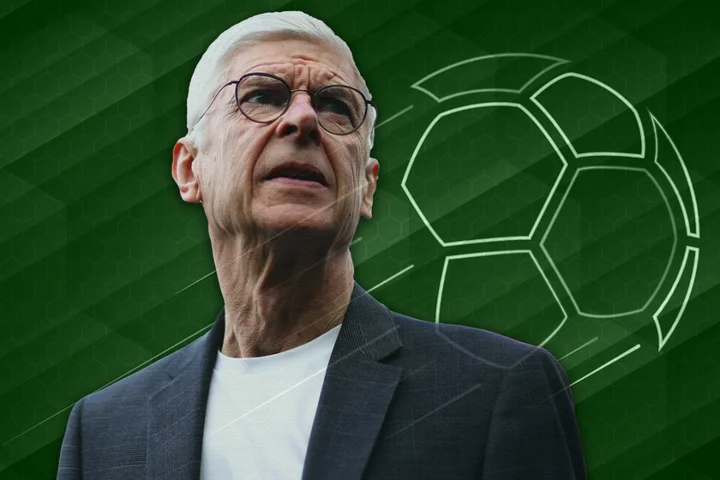
Arsene Wenger reveals his blueprint for the future of football
There are still moments when Arsene Wenger sits at his desk in Zurich – of course overlooking every type of pitch, from 11-a-side to beach football – and wonders about the scale of the task he has taken on. Perhaps facing Sir Alex Ferguson or Pep Guardiola was easier. “When you sit here and think, ‘I have to improve football in the world’, you realise that it’s not easy, you know," Wenger laughs, before gesturing to the pitches below. "I would rather say ‘give me a team and down there I can show you what I can do’. But once you sit here and say, 'how much, 211 countries? OK, thank you very much!’” And yet, as great as Wenger’s managerial legacy is, there are so many moments in speaking to him about his role as Fifa chief of global football development when it’s impossible not to wonder how much the wider game could have benefitted from his rare insight. “I can understand that as long as I was at Arsenal I didn't care too much about that because I had to win the next game," he says. "Once you have a global vision of world football, you realise something is not right.” Wenger has probably attracted most focus in the role for fronting the move for a biennial World Cup, but his real work – and a truly great responsibility – is raising the level of the sport across the planet so every country and every child has a chance. “I believe really football can change the world,” he said at the Fifa Women’s Football Convention in Sydney last month. “Not just on the football side, the human side. That’s the next step.” Wenger is sitting here on transfer deadline day explaining in a wide-ranging interview with the Independent exactly how. It is a particular challenge when he goes to countries like Cote d’Ivoire and the president tells him they haven’t had an official youth game in five years. “And here you have Yaya Toure, Didier Drogba, Kolo Toure, you know we have the players, it’s a football country,” Wenger says. “I always think there’s a little girl or a little boy who has a dream, has the talent and no opportunity.” It’s all the more frustrating for Wenger since there is now a strong argument that football is the most popular cultural pursuit the planet has ever seen, particularly with the way it spreads into the United States and India, all while developing huge money. Most of that, however, stays in one corner of the globe. “In Europe, it's all done and we are a little bit not conscious of the needs elsewhere, because in some countries there's no [football] education… it’s incredible. “Football is conquering the world at an unstoppable speed and at the moment there is a dysfunction between the audience and the practice in some countries.” In other words, there aren’t the resources to match the interest: the dream. Wenger talks about how the first steps to solving this are creating free centres of excellence for the best young talent and spreading out from there to create grassroots structures. Fifa is currently funding 25 academies, and the former Arsenal manager recently had the coaches involved at his office for the final preparations. Such is the nature of the discussion and the nature of his thinking, though, that an hour-long interview spreads into all manner of areas. They include: How football may have to “create striker schools” to solve a lack of goalscorers How modern academies offer high technical quality but have meant “we lose a bit of that freedom, that creativity” How pressing has affected that “The trend in some academies is to recreate park football” How football isn’t producing anywhere near as many good players as it could “Does the world produce enough good players? I think no” How this has led to an inflated transfer market, where “everybody thinks the same” Why countries like Croatia and Uruguay are so repeatedly successful How football is addressing these issues There’s then the vintage manner he offers profound insights about football, and seemingly simple lines that capture so much, just in sitting there talking about it. Employing Wenger to directly study the game only amplifies that, which is what he has spent the last few years doing since taking the job in 2019. “We analysed football in 205 countries and we found in half of the world there’s a deficit in education… which I mean as identification of talent, coaching programme, quality of coaching, quality of the competitions and integration in the first team. “What we basically found out by analysing the whole world is there’s a huge correlation between the quality of the educational system and the results in the first team. That was mathematics. “We proposed to each member association to help them to develop the education. Basically, if you have no education in life, you have no chance so my purpose was of course to change that.” Some of the challenges themselves come from what has been one of the most transformational factors in the modern game. That is the way a sequence of wealthy western European countries like France, Spain, Germany and now England have essentially industrialised talent production. Wenger himself points to how Clairefontaine-fashioned underage teams were thrashing England’s when he arrived at Arsenal in 1996, but that no longer happens. England has caught up. It’s put to him that the old line from journalist and former footballer Eamon Dunphy - that “dictatorships and poverty” produce good footballers - no longer applies. It is typical Wenger, though, that immediately leads to another fascinating path of discussion. “No, no, I would say it's quality of education. What has dropped in recent generations is that of course park football has disappeared and now the trend in some academies is to recreate again what happened before. The game itself is a good coach. “Why? Because, if I play in the park, I have to make decisions. If I’m shrewd enough to think why did that not come off, and have a right assessment, the next time I am in the same situation I am correct. We have lost that a little bit. And maybe today we are overcoaching a little bit sometimes, and we lose a bit that freedom, that creativity, that individual personalised training that happened before.” A classic example of what Wenger is talking about comes from one of the most famous goals of all time. In bearing down on Peter Shilton in the 1986 World Cup quarter-final, Diego Maradona remembered a previous occasion when the England goalkeeper went one way. So, at this moment of heightened tension and consequence, the Argentina great went the other way. The rest is history, but the evolution since has removed something from the game’s present. Wenger believes the greatest cost of the more homogenised academy system is with that fundamental of the game - putting the ball in the back of the net. Or, more specifically, he believes it has resulted in a decline in strikers that has inevitably brought a decline in classic centre-halves, too. READ MORE: ‘Would Messi still have been Messi?’ A lost generation of future footballers The hermetically sealed nature of modern academies has meant young players are not “educated for the fight” in the same way. “I think football has improved dramatically all over the world but some positions today are more difficult to find because maybe the evolution and the quality of the coaching has suppressed natural fighting qualities in positional play. “The emphasis has become more on quality of passing, quality of coaching. What you lost from the wild football is, if you go out now to a training session here, it will be built to start with passing, after that the quality of possession. “Before, the training pitches were not good, so you had to lift the ball to the striker. A striker had to fight to get the ball so, naturally, you develop qualities that, with the passing, you develop a little bit less. “If we go out there and play in the park, you think you have to score goals to win the game. Then you have to fight. “As well, the man-to-man marking has disappeared so it’s easier to get the ball. You are less confronted with fight. You see that in Germany. Since they play zonal they don’t produce strikers anymore. “If you look at the global evolution, we have moved away from defenders who only defend, from strikers who only attack, from midfielders where some defend and some attack, to be more demanding completely. Technically, today, the players in every position need to be better because of higher demands than 30 years ago. The pace is higher, the athletic side is higher. So, today, the right-back is technically better, the centre-back is technically better. Of course, you had exceptions in history but maybe it has also kicked out specificity; the creativity of some players because of the pace. “Overall, every player in each position has become a more complete player. I would say because we have gone in a more specific passing game today, the demands on the striker to score is smaller than it was before. Jurgen Klinsmann made an interesting point on that at the World Cup. He said to me. ‘I played with only one thing: I have to score. I feel the strikers today judge their own game by how they combine with other players. I only judged my game on did I score or not.’” READ MORE: The Premier League is having an identity crisis – but one thing can save it So, how does football solve this? Wenger believes this is being deeply considered, and that Erling Haaland represents a throwback who could point to a new spin on an old way. “At the end of the day, no matter what you do, football is always the quality of the one who gives you the ball and the one who puts it in the net. It’s true you find more good passers now than finishers. “And you can develop these qualities. I think it’s something that will be addressed. Now, after 15 years of age, we have to start specialisation and positional play. “Finishing under pressure. Finishing by being challenged and the quality of the movement… to get that responsibility on their shoulders, that their focus every day is to score, to fix them targets. So maybe we have to create striker schools, internally inside the club, or more specific work. I think it’s on the way to happening now. “If I look at Haaland, Haaland is for me the real typical striker. He looks like he is ready for the fight, ready to be focused on only scoring goals. Like [Olivier] Giroud is a real striker in mentality, that explains why he’s still playing at 36, 36. And [Zlatan] Ibrahimovic, [Karim] Benzema, they have been educated for the fight, they have been educated to finish as well. “In France now, you have some good strikers again. Germany, where they had big strikers, they have less. They are thinking now how they can change that again.” It may bring a change in centre-halves, too, given how interlinked the two roles are. As someone who used to play in that area himself, Wenger now feels Jamie Carragher is right that it might be the most demanding position in the game. “At the end of my career, you wanted centre-backs to play out from the back. Today you want the centre-back to play like a number-10 and to defend as well, to be tough. Fighting and to play. It’s tough to always find that balance.” That, for Wenger, is also where the beauty lies. “You know, football is magic for me because there is a good balance we have to make between the technical, the physical and the tactical,” Wenger adds. “So, for example, one of the things we are cautious to change is the offside rule because we want to keep that balance right. READ MORE: The trick that made Erling Haaland the ultimate finisher – in more ways than one If I play for example against [Kylian] Mbappe, the only advantage I have is to play him offside. If offside is even more difficult for me to play, I have no chance anymore. So what can I do? When his team has the ball I can run in the box because I wait for him. The rest, I have no chance! Haaland is the same. “So, when you press, the defence has to move up, and the space is behind me. Against the quick players, it becomes even more difficult. That is a good example of the evolution of the game. The attack gives you a new problem. The defence responds by analysing your superiority. Then the attack finds a new solution and creates again a new problem and the defence comes behind. “So I would say now how do you slowly fight against the pressing, it’s by getting the players better technically. Evolution is created by opposition.” There is a similar dynamic in the transfer market, which has influenced some of this summer’s excesses. Whereas it used to be that Luis Figo and Zinedine Zidane would command the record fees because they were in their prime and had established careers that offered absolute proof of quality, that sort of expenditure is now geared towards much younger talent. Even teenagers like Rasmus Hojlund and Jude Bellingham have gone for huge fees. Part of that is their ability, particularly with Bellingham. Part of it is the premium on their positions, particularly with a striker like Hojlund. Part of it is the thinking. “What is happening now is because clubs think that confirmed players are so expensive, they try to fight for the younger players. They are thinking they will get them at the cheaper price. The fact that everybody thinks the same makes the prices of the younger players too high, in my opinion. Why? Because it is at 19, 20, 21 where you see if the player has the capacity to cope with the pressure. READ MORE: The year that sportswashing won: A season that changed football forever “For the confirmed players, with the high levels of transfers come high wages and even clubs like Real Madrid cannot cope with both. What is the trend in the top markets? They get the players to go to the end of the contract to be capable of giving the players the wages they want. And it looks like now the competition with Saudi Arabia will even increase that, so overall I would say there’s more fight for the young players. “But two questions. Does the world produce enough good players? I think no, and I believe as well that the prices depend on the identity of the buyer. If he is tomorrow president of Young Boys Berne [gesturing towards Fifa media officer Stefan Curtis] and I am Arsenal, I will come to see him. ‘Who are you? Arsenal, OK, English, I have a good player.’ In Switzerland he would sell for £5m, in England for £50m. So somewhere, the identity of the buyer fixes the price.” It’s a theme that brings together much of Wenger’s work, and why it is so important for the game, as well as how it’s played. So much of the money is concentrated in western Europe, and particularly the Premier League, which has in turn generated even more mega interest around the rest of the world. Many countries don’t have anything like the same resources, though, which has meant they cannot maximise the potential talent. The talent they do have is meanwhile quickly bought up, reducing the quality of their domestic competitions as well as the money the football culture can consequently invest. Part of Wenger’s great mission, beyond just changing the world by changing the football world, is to lift the level of their entire game; to restore a vitality. “I believe the globalisation of the world has concentrated the big money in a few number of clubs,” Wenger emphasises. “his few number of clubs has a huge potential and the rest of the world watches the Premier League. So, what does a guy in China or South Africa do in the morning? He thinks ‘ah, Premier League.’ Why? Because the best players play there and that reinforces the Premier League even more, so that means the concentration of the money in the small number of clubs has created even an inflated market. “And then once you have all the best players in the world in the same league, that means if I have a Chinese player in the Premier League, all China will watch the Premier League. That reinforces even more that superiority. “What I want to create is that in Angola, for example, we produce as well players who are good enough to produce a quality in their own championship, that the guy can have a choice. ‘Yes, I will still watch the Premier League but in my league something is happening as well - oh, here we have as well some good players’. Then it creates interest. “That’s why I tell you the deficit of education today is detrimental to the quality of the championships and as well to the quality of the national teams worldwide.” This is the “dysfunction” Wenger spoke about. “For example, the television audiences in India are very high, in China very high, but the players are not educated at the same pace,” Wenger maintains. “What we want is to provide them with the capacity to play. That’s our target.” If the targets are the same for every country, the challenges are different. While an emphasis will inevitably be on countries of inferior resources, those with more resources can bring the opposite problem, which is privatised football; or coaching that costs parents more money. The most obvious example is the United States’ “pay to play” system. “We have in some countries a lack of football culture,” Wenger concedes. “A lack sometimes of structures, and in some countries, because the private academies have taken over, a child from a poor background cannot pay to get into the football school. It’s exactly the reverse of what I want to do.” It’s also the opposite of what football represents. “You can play with an orange or you can make a ball with paper. That’s why football is so popular. But today if you want to get to a good level of education in football, in some countries you don’t get it. I find that not right because, in many countries, there are some private initiatives, but the parents have to pay to get the children in there. “For me it doesn't matter if you're rich or poor. If you are good, you come in. Our academies are free, just open to talent. You have to adapt and find a solution in every country.” *** It is here when another Wenger thought opens a whole new avenue of discussion. In this case, it is how some national teams constantly overperform. “What we found out, and what explains countries like Croatia, like Uruguay – who are small countries, three million people – is that a number of good players on a short surface is more important than a number of good players on a big surface.” In other words, they’ve realised how to use their size to an advantage, by being able to bring the best talent together more easily and enjoy a multiplying effect. “I realised 40 years ago from a study I made for Netherlands, why I want to put the best with the best. Because they play against each other, they stimulate each other. That explains countries like Netherlands, Croatia, Uruguay. “They keep creating teams and players because they have a good level of education and identification of talent. “Croatia was in the last four of the last two World Cups so that means success is not limited to big countries. It is just limited to the quality of education and organisation.” It is also a newly romantic virtue of international, that has inverted a lot of football history. It now offers a vitality that the club game can’t. No matter how big the population, international managers have to make do with what they have. The biggest clubs just buy what they lack. “Yes, the international team game is rewarding the quality of the educational work. The club game, and I am a big fan of big clubs, is the recruitment of the best players from all over the world. It’s fantastic, but I think you need the two, to give everybody the chance. “For example, Croatia today cannot compete with their clubs, at the top level, because the players leave early. Then they come back and compete with their national team so they are rewarded for the quality of their work. READ MORE: The famous Croatia shirt is transforming good players into World Cup greats “That’s our target. In Africa, it’s the same. In Concacaf it’s the same. I come back from Australia, football is unstoppable. “The boy or the girl wants the dream. When they watch football players, when they see the World Cup, when you watch it, you have the dream, which is to play football and to lift the World Cup. We create the dream. But we do not have at the moment the capacity to fulfil this dream.” That’s what he is pondering as he sits at that desk. It is in some ways the same as when he was a club manager, speaking to why the game is so popular. It’s to fulfil the dream. Read More Sportswashing is about to change football beyond anything you can imagine How modern football became broken beyond repair ‘Would Messi still have been Messi?’ A lost generation of future footballers Arsene Wenger defends Fifa’s time-wasting crackdown Spain manager Jorge Vilda sacked by Spanish FA amid Luis Rubiales crisis Manchester United share price crashes by £500m after report Glazers may not sell
1970-01-01 08:00

Britain's second-largest city effectively declares itself bankrupt amid $950 million equal pay claims
Britain's second-biggest city effectively declared itself bankrupt on Tuesday, shutting down all nonessential spending after being issued with equal pay claims totaling up to £760 million ($956 million).
1970-01-01 08:00
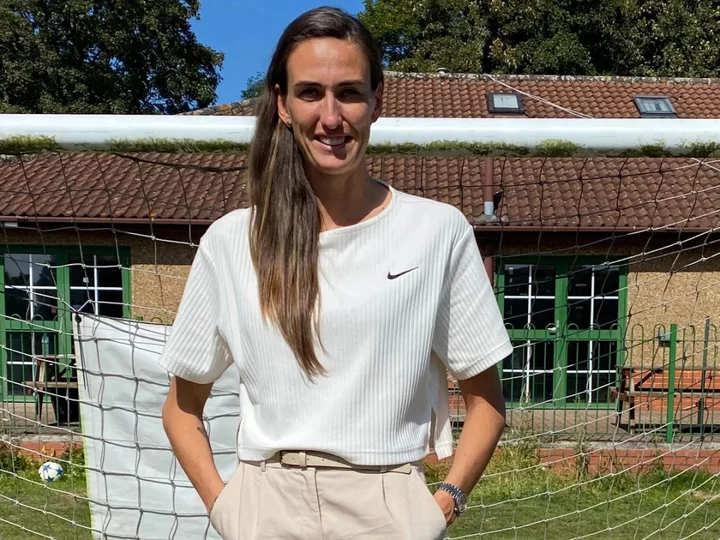
Jill Scott says World Cup kiss saga ‘overshadowed’ Spanish women’s team playing ‘great football’
Euro 2022 winner Jill Scott has voiced “disappointment” that the World Cup kiss saga has detracted attention from the Spanish women’s team win. The former England midfielder told The Independent that issues within Spanish football have “overshadowed” the team’s “great football”. Her comments come after the president of the Royal Spanish Football Federation Luis Rubiales has come under sustained criticism for kissing player Jenni Hermoso on the lips after Spain secured their 1-0 win over England last month. Rubiales, who was also condemned for grabbing his crotch after Spain won the women’s world title for the first time in history, has refused to step down over his behaviour but was suspended by Fifa. It comes as Jorge Vilda, head coach of Spain's women’s team, was fired on Tuesday after he was among those who praised Rubiales’ refusal to step down. Scott said she felt “disappointment” that the kiss has been “the main talking point”, rather than Spain actually winning the World Cup. “I know that there were girls that decided not to go to the World Cup because they weren’t happy with the way things were going. And that for me is just so sad to hear because it’s a dream to play in a World Cup. “I was so fortunate that I got to do that four times, and it’s something that you dream of from being a young girl, and to think that was taken away from them. First and foremost, that is sad.” Speaking to The Independent in a wide-ranging interview, the Lioness also discussed the bullying she endured as a young girl playing football at school. She said people often thought she was a boy because she played football and questioned how girls could play the game. The 36-year-old said it was “unusual” to see girls playing football back then and said she sometimes suffered worse bullying from parents rather than her classmates. “Sometimes for parents, if a young girl back then – I’m going back 30 years – beat their son, it was a bit of an embarrassment,” she added. Scott said she would attend football camps where she was the one girl alongside 50 boys, as well as going to football tournaments where she was the only girl. The former footballer said even though she was better at football than some of the boys she “never wanted special treatment for being a girl”. Scott added: “I just wanted to play football and as a young kid, I didn't understand why it was such an issue that I just wanted to play football.” She continued: “Once I stepped over that white line, that was where I wanted to be. I could escape everything.” Her comments come as new research by Starling Bank found three in 10 girls stop playing football when they get to their late teenage years – a far higher proportion than the one in ten boys who give up the sport. Researchers, who polled 2,000 11 to 16-year-olds in the UK, found that over a quarter of girls quit football over pressures to perform well at school. Meanwhile, 14 per cent stop playing because of insecurities about their body image and eight per cent bow out of football for being bullied for playing the game. Scott, who is an ambassador for the bank, said social media pressure was partly to blame as it puts pressure on girls to make them feel like they should look a particular way. “It’s kind of this perfect world isn't it, in a sense,” she reflected. “And I think we're all guilty of doing it. We don't want to post a picture unless you look good or if it’s filtered.” Scott explained she has coached football to girls aged between 13 and 15 and you can see they do not want to get “stuck into a tackle” or do not “want to get sweaty” due to anxiety about how they will look. Read More Spanish FA chief blames player for World Cup kiss and shouts ‘I am not resigning!’ in chaotic press conference Spanish soccer federation fires women's national team coach Jorge Vilda amid Rubiales controversy ‘He wasn’t raping her’: Woody Allen offers staggering defence of Spanish football boss Luis Rubiales ‘History in the making’: Lionesses’ Euros success sparks booming interest in women’s football Lioness Demi Stokes says misogynistic abuse online ‘really affected’ England players’ game
1970-01-01 08:00
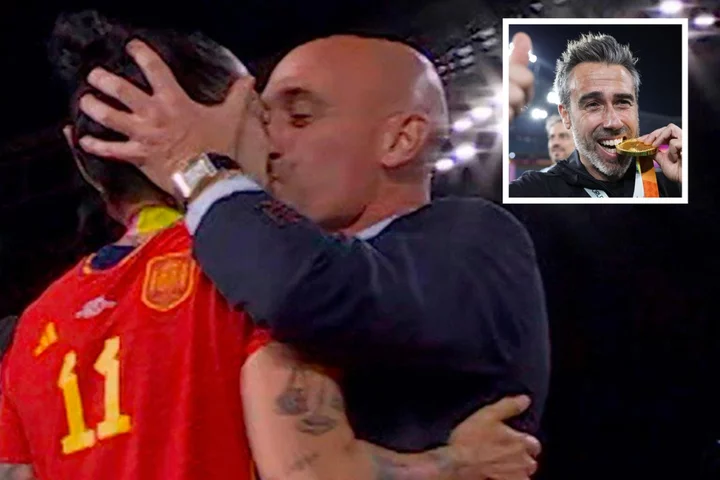
Spain manager Jorge Vilda sacked by Spanish FA amid Luis Rubiales crisis
The Spanish Football Federation has sacked women’s manager Jorge Vilda only two weeks after winning the World Cup amid the ongoing Luis Rubiales crisis. Vilda’s entire playing and coaching staff resigned in protest against Rubiales, the Federation (RFEF) president who refused to step down over his conduct during the final in which he kissed forward Jenni Hermoso on the lips during Spain’s trophy presentation. He was also pictured handling other players, kissing them on the cheek and grabbing his own crotch in an aggressive celebration. Rubiales has been provisionally suspended by Fifa from all football-related activity and banned from contacting Hermoso or those close to her while an investigation is carried out. In a speech made to RFEF officials and the media, Rubiales refused to resign and hit out at a “witch hunt” against him – and Vilda was pictured in the audience applauding the man who appointed him as head coach of the women’s team in 2015. Vilda later issued a statement condemning Rubiales’ conduct but did not resign, and he has now been removed from his post, according to multiple reports in Spain. Vilda has long been a controversial and unpopular figure among the Spanish squad. His team looked to be on the brink of implosion 12 months ago when 15 players made themselves unavailable for selection, saying that the environment of the national team was having a negative impact on their mental health and emotional wellbeing. They complained about the oppressive nature of Vilda’s managerial regime and were unhappy about how outdated the international set-up seemed. Some of the arrangements, like travelling long distances by bus or not having staff in certain key roles, fell well below their standards at club level and they did not feel the Spanish FA was given them the best chance of fulfilling a unique generation of talent. Other complaints included the coach’s demands that their hotel room doors remain unlocked until midnight, and that their bags were routinely checked. Meanwhile, the current RFEF president, Pedro Rocha, has written a letter distancing the organisation from Rubiales’ actions, saying he is “ashamed” by them. “The damage caused to Spanish football, to Spanish sport, to Spanish society and the values ​​of football and sport as a whole have been enormous,” Rocha’s letter said. “Mr Rubiales’ actions do not represent the values ​​defended by the Spanish federation, nor the values ​​of Spanish society as a whole. “His actions must be attributed solely and exclusively to him, since he is the one solely responsible for those actions before society, before the sports governing bodies and, if applicable, before justice. To be clear, this position was that of Mr Rubiales, not that of the RFEF. We feel especially sorry and ashamed for the pain and additional distress this has caused.” more to follow... Read More Luis Rubiales speaks out to ‘continue defending myself’ over kiss scandal Spain manager asks for ‘forgiveness’ after applauding Luis Rubiales speech Watch: Wiegman dedicates Women’s Coach of the Year award to Spain players
1970-01-01 08:00
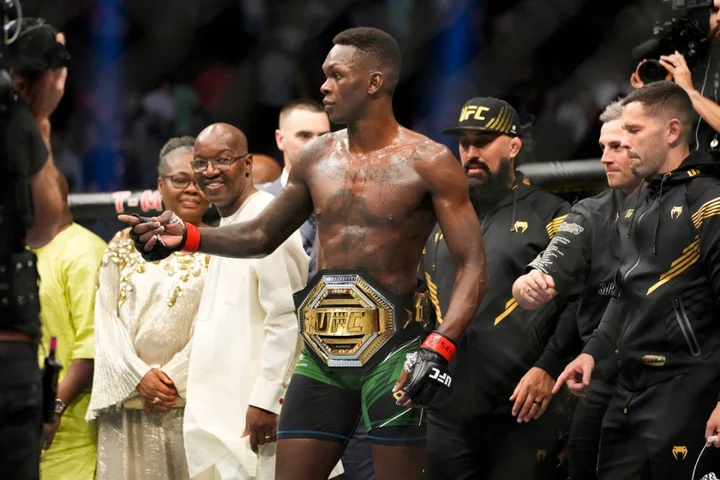
UFC 293 card in full as Adesanya defends title against Strickland this weekend
The middleweight title is on the line in the main event of UFC 293 this weekend, as Israel Adesanya defends the belt against Sean Strickland. Adesanya became a two-time champion in April, knocking out Alex Pereira to take back the gold that he lost to his old rival in November. The Nigerian-New Zealander was eyeing a fight with Dricus Du Plessis as the first title defence of his second reign, but Du Plessis is recovering from an injury, opening the door for the controversial Strickland. Ranked fifth, Strickland (27-5) enters Australia on a two-fight win streak, with many fans interested to see and hear the American’s verbal exchanges with Adesanya (24-2) this week. Here’s all you need to know. We may earn commission from some of the links in this article, but we never allow this to influence our content. This revenue helps to fund journalism across The Independent. When is UFC 293? The event is set to take place on Saturday 9 September, at the Qudos Bank Arena in Sydney, Australia. The early prelims are due to begin at 11.30pm BST (3.30pm PT, 5.30pm CT, 6.30pm ET), with the regular prelims following at 1am BST on Sunday 10 September (5pm PT, 7pm CT, 8pm ET on Saturday). The main card is then scheduled for 3am BST on Sunday (7pm PT, 9pm CT, 10pm ET on Saturday). How can I watch it? The card will air live on TNT Sports in the UK, with the broadcaster’s app and website also streaming the fights. In the US, ESPN+ will stream the action live, as will the UFC’s Fight Pass. If you’re travelling abroad and want to watch the event, you might need a VPN to unblock your streaming app. Our VPN round-up is here to help: Get great deals on the best VPNs in the market. Odds Adesanya – 2/13 Strickland – 9/2 Via Betway. • Get all the latest UFC betting sites’ offers Full card (subject to change) Main card Israel Adesanya (C) vs Sean Strickland (middleweight title) Tai Tuivasa vs Alexander Volkov (heavyweight) Manel Kape vs Felipe dos Santos (flyweight) Justin Tafa vs Austen Lane (heavyweight) Tyson Pedro vs Anton Turkalj (light-heavyweight) Prelims Carlos Ulberg vs Da Woon Jung (light-heavyweight) Jack Jenkins vs Chepe Mariscal (featherweight) Jamie Mullarkey vs John Makdessi (lightweight) Nasrat Haqparast vs Landon Quinones (lightweight) Early prelims Mike Diamond vs Charlie Radtke (welterweight) Shane Young vs Gabriel Miranda (featherweight) Kevin Jousset vs Kiefer Crosbie (welterweight) Read More Deja vu for Ciryl Gane as heavyweight scores statement win at UFC Paris UFC president Dana White hits out at ‘idiot’ who tried to break into his house UFC schedule 2023: Every major fight happening this year
1970-01-01 08:00
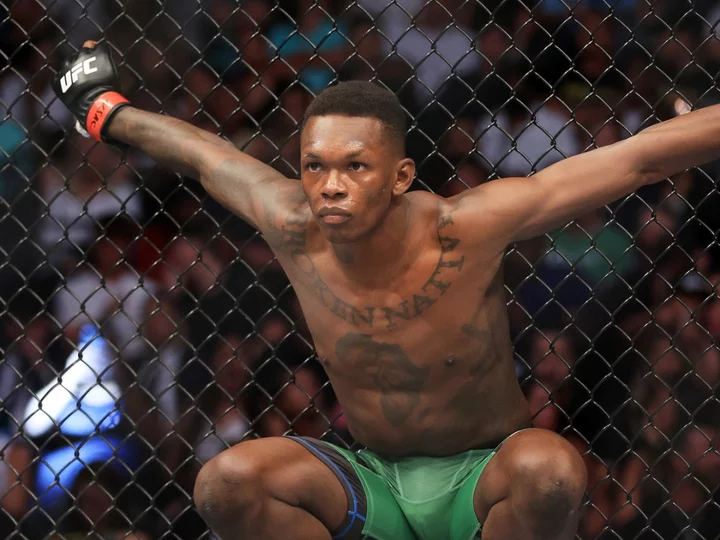
Adesanya vs Strickland time: When does UFC 293 start in UK and US this weekend?
Israel Adesanya takes on Sean Strickland in the main event of UFC 293 this weekend, defending the middleweight title in Sydney. Adesanya began his second reign as champion in April, knocking out Alex Pereira to finally earn a win over his old rival, who took the belt from Adesanya in November. Now, the Nigerian-New Zealander defends the gold against Strickland, with the controversial contender entering Australia on a two-fight win streak. American Strickland, ranked fifth, was Adesanya’s second choice for a challenger here; the champion had his eyes on Dricus Du Plessis, but the South African sustained an injury to delay that potential grudge match. Many fans, however, are excited to see Strickland (27-5) finally get his shot at Adesanya (24-2). Here’s all you need to know. We may earn commission from some of the links in this article, but we never allow this to influence our content. This revenue helps to fund journalism across The Independent. When is UFC 293? The event is set to take place on Saturday 9 September, at the Qudos Bank Arena in Sydney, Australia. The early prelims are due to begin at 11.30pm BST (3.30pm PT, 5.30pm CT, 6.30pm ET), with the regular prelims following at 1am BST on Sunday 10 September (5pm PT, 7pm CT, 8pm ET on Saturday). The main card is then scheduled for 3am BST on Sunday (7pm PT, 9pm CT, 10pm ET on Saturday). How can I watch it? The card will air live on TNT Sports in the UK, with the broadcaster’s app and website also streaming the fights. In the US, ESPN+ will stream the action live, as will the UFC’s Fight Pass. If you’re travelling abroad and want to watch the event, you might need a VPN to unblock your streaming app. Our VPN round-up is here to help: Get great deals on the best VPNs in the market. Odds Adesanya – 2/13 Strickland – 9/2 Via Betway. • Get all the latest UFC betting sites’ offers Full card (subject to change) Main card Israel Adesanya (C) vs Sean Strickland (middleweight title) Tai Tuivasa vs Alexander Volkov (heavyweight) Manel Kape vs Felipe dos Santos (flyweight) Justin Tafa vs Austen Lane (heavyweight) Tyson Pedro vs Anton Turkalj (light-heavyweight) Prelims Carlos Ulberg vs Da Woon Jung (light-heavyweight) Jack Jenkins vs Chepe Mariscal (featherweight) Jamie Mullarkey vs John Makdessi (lightweight) Nasrat Haqparast vs Landon Quinones (lightweight) Early prelims Mike Diamond vs Charlie Radtke (welterweight) Shane Young vs Gabriel Miranda (featherweight) Kevin Jousset vs Kiefer Crosbie (welterweight) Read More Deja vu for Ciryl Gane as heavyweight scores statement win at UFC Paris UFC president Dana White hits out at ‘idiot’ who tried to break into his house UFC schedule 2023: Every major fight happening this year Conor McGregor finally receives black belt in jiu-jitsu Mark Zuckerberg trains with UFC champions on speedboat Former Tyson Fury opponent backs Francis Ngannou to drop ‘Gypsy King’
1970-01-01 08:00
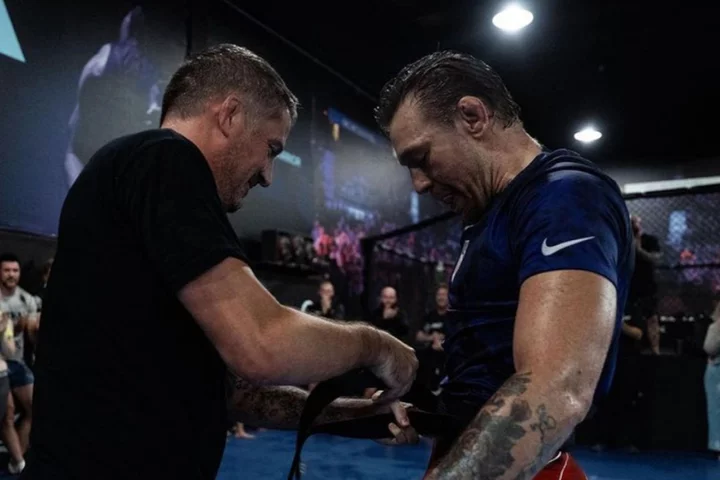
Conor McGregor finally receives black belt in jiu-jitsu
Conor McGregor finally received his black belt in jiu-jitsu this week, with his coach John Kavanagh presenting it to the former UFC champion at the SBG Ireland gym. McGregor has begun training ahead of a planned fight with Michael Chandler in late 2023 or early 2024, and he was filmed sparring with Irish UFC prospect Ian Garry in Dublin on Sunday. While in his native Ireland, McGregor also took part in a jiu-jitsu class with his longtime coach, who ended the session by awarding the 35-year-old his black belt. “It’s not normal to give out a belt during the no-gi class,” said Kavanagh, “but nothing about this man’s career or life has been normal. An incredible exponent of martial arts his whole life, he obviously excelled in the professional area. But for me, it’s his interest and his passion about it day to day, whether it’s working with the new guys or training with pros. “It’s a huge pleasure for me to give [this to] a longtime student but also one of my best friends, Conor McGregor.” An emotional McGregor then said: “I appreciate this, guys. Thank you, John, for so much over the years. It’s just great to be home, great to be around UFC talent and see all the talent here around the gym. I’m with SBG for life, and I appreciate this. It means the world to me, thank you so much. “I’ve been doing this a long time, you know? It’s my life. To get it off John, it’s not even about... It’s deeper when you get a black belt off John. There’s not many black belts off Coach Kavanagh. It means the world. “I’ve been here, what, 20 years? So, that’s how long it takes to get a black belt off that man!” McGregor also re-posted a tweet that he first shared in November 2013, which read: “I just want two gold belts, a jiu-jitsu blackbelt, a hall of fame plaque and 25 million in the bank. Is that too much to ask? Gym time!!” McGregor would go on to become the first dual-weight champion in the UFC, after achieving the same status in Cage Warriors, and his net worth was estimated by Forbes to be $180 million in 2021. The Irishman is also a surefire UFC Hall of Famer. He last fought in July 2021, however, suffering a broken leg in his second straight loss to Dustin Poirier, who knocked him out six months earlier. Read More Mark Zuckerberg trains with UFC champions Adesanya and Volkanovski on speedboat Adesanya vs Strickland live stream: How to watch UFC 293 online and on TV this weekend Derek Chisora backs Francis Ngannou to drop Tyson Fury UFC schedule 2023: Every fight happening this year Conor McGregor makes sudden U-turn over UFC comeback Mark Zuckerberg trains with UFC champions on speedboat
1970-01-01 08:00
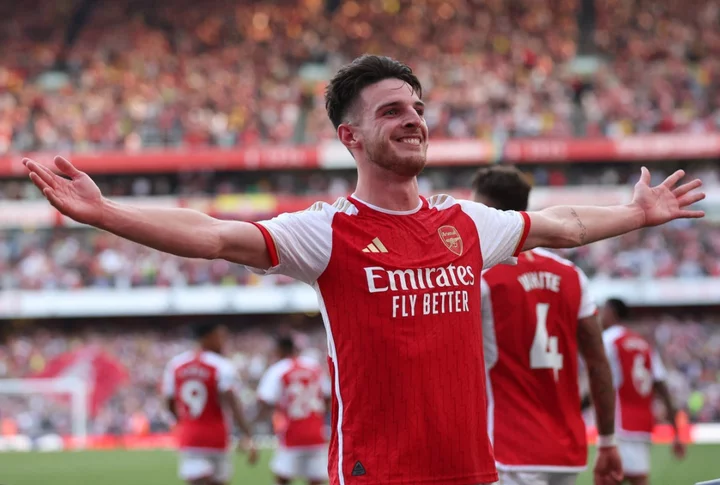
Declan Rice shows what Arsenal have and what Chelsea don’t after creating £100m midfielder
A few years ago, Declan Rice said he would have passed. Now, however, the £105m man assumed responsibility, shot and, via a deflection off Jonny Evans, gave Arsenal a 96th-minute lead against Manchester United. As Gabriel Jesus scored an even later goal, it was not technically the winner. But Rice was the scorer of the de facto decider in the sort of match that can define seasons and establish reputations. Perhaps particularly for central midfielders, given that it is a fixture that evokes memories of Patrick Vieira against Roy Keane. Vieira scored the winning penalty in an FA Cup final shootout against United; Keane scored a disproportionate number of his United goals – five, almost 10 percent – against Arsenal. Rice’s first in Arsenal colours came at United’s expense. The most expensive Englishman ever can appear something of a throwback player: called a defensive midfielder, but often an all-rounder, in the way the Frenchman and the Irishman were. His post-match interview was conducted next to Keane who, like Graeme Souness, a similarly dominant and brilliant midfielder and another whose punditry could focus more on personalities than tactics, subscribes to the great man theory of history: as a footballing great himself, he tends to argue that matches are determined by the determination of individuals, by a willingness to seize the moment, by winning a personal battle. It suits him to argue games are won by warriors, not formations involving inverted full-backs or box midfielders. Football has grown more complex, the tactical intricacies of managers such as Mikel Arteta and Pep Guardiola reducing the significance of going mano a mano with the opposition’s alpha male. And yet, in the age of the £100m midfielder, perhaps Rice has a responsibility to be more than just another cog in the wheel, to be the match-winner at least sometimes. If it is simplistic to demand a tangible impact that always equates with his price tag for a player whose contribution stretches far beyond goals and assists, he is nevertheless charged with improving Arsenal. Turning one point into three and winning a game against rivals is a way of doing that. And if philosophies and systems seemed to have reduced the reliance on the individual, there is evidence in the midfields of Arteta and Guardiola that football can still come down to big players producing big deeds at big moments. Ilkay Gundogan spent the first half of his Manchester City career as a neat passer. In the second half, he was transformed into the man for the big occasion, the scorer supreme who could use his footballing intelligence to find space and his technique to finish. It was, in part, why he became captain; by the time of his FA Cup final brace, he felt more Roy of the Rovers than Sergio Busquets. As the defensive midfielder, Rodri’s primary responsibilities were to engineer perpetual possession and to cut off counter-attacks. Yet as the Spaniard grew in stature, he has tended to deliver crucial contributions: most obviously the Champions League final winner and most recently the superb late decider at Sheffield United but a pre-Rice Arsenal can probably still remember and regret his injury-time winner at the Emirates Stadium on New Year’s Day in 2022: if the sense is that managers like Guardiola and Arteta want their midfielders to be elegantly robotic, executing a strategy with practised excellence, the importance of individual interventions is still apparent. Rice need only gaze across the Arsenal midfield to see. Martin Odegaard joined with certain similarities to Gundogan: obviously an assured passer, he has turned himself into an accomplished scorer as well as a regular skipper. The Norwegian’s two goals this season, a nerveless penalty at Crystal Palace and a swift equaliser against United, were signs of his substance, of a capacity to deliver when it matters. That Rice did likewise feels auspicious. He has cost the sort of sum that used to be reserved for attackers. Chelsea created the £100m midfielder and now have two of them, a £222m double act. That can seem the product of a shift in thinking, recognising the significance of dictating a game. But there is still the need to decide it. Enzo Fernandez has shown his incisive passing as he has become increasingly creative: that he only has two assists in their colours is in part a reflection of others’ poor finishing. But the Argentinian has a lone goal himself, and that was against AFC Wimbledon of League Two, while he missed a penalty at West Ham. Moises Caicedo’s Chelsea career has only spanned 205 minutes on the pitch and, while Fernandez has been used as a No 10 of late, the Ecuadorian’s deeper role means he is likely to score fewer goals than the World Cup winner or Rice. Nevertheless, at such a colossal cost, each was bought to make a difference. And when, deep into added time, it seemed Arsenal would drop two points, Rice did. Read More Arrest after Roy Keane allegedly headbutted at Emirates Stadium Arsenal forward Gabriel Jesus hopes he has seen the last of knee niggles Declan Rice rises to the moment as Arsenal avoid disastrous slip-up
1970-01-01 08:00
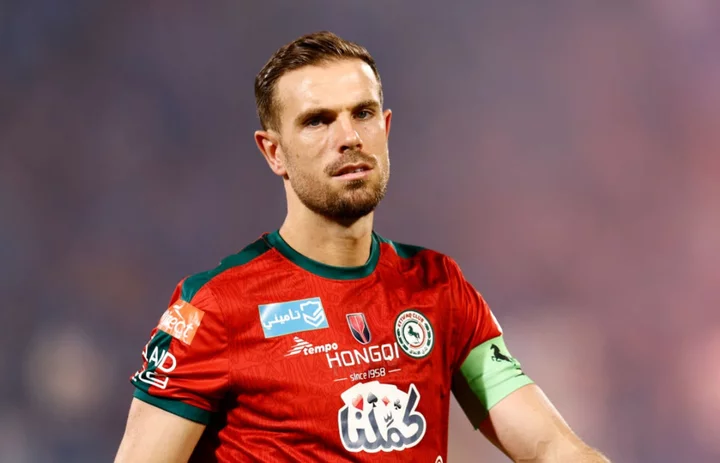
Jordan Henderson responds to criticism from LGBTQ+ community after Saudi move
Jordan Henderson has apologised to the LGBTQ+ community after the former Liverpool captain’s move to Saudi Arabia. The England international, who joined Steve Gerrard’s Al-Ettifaq this summer in a £12m move, has been a vocal supporter of the community and campaigns to support its inclusion in the sport. Henderson, who has been a leading voice in the Rainbow Laces campaign and has worn a rainbow armband when captaining Liverpool, caused controversy this summer with his move to Saudi Arabia, where homosexuality is illegal. “I can understand the frustration [from the LGBTQ+ community],” Henderson told The Athletic. “I can understand the anger. I get it. All I can say around that is that I’m sorry that they feel like that. My intention was never, ever to hurt anyone. My intention has always been to help causes and communities where I felt like they have asked for my help . Henderson was one of three Liverpool players to move to the Saudi Pro League, with Fabinho signing for Al-Ittihad and Roberto Firmino linking up with Al-Ahli as a free agent. The 33-year-old, who is yet to score for Al-Ettifaq, has helped Gerrard’s side to a positive start, currently sitting fifth in the table after five games. Henderson was cautious when pushed about future involvement in the Rainbow Laces campaign, highlighting the prospect that it could “disrespect the religion and culture in Saudi Arabia”. Henderson also insisted his move to the Saudi Pro League will have a positive impact, but stopped short of predicting any meaningful change. “I think people know what my views and values were before I left and still do now. And I think having someone with those views and values in Saudi Arabia is only a positive thing. I can’t promise anything, but what I can do is sit here and say I have my values and beliefs,” Henderson added. “I’m comfortable knowing exactly what I am and exactly what I stand for. But I get and I can accept not everyone’s going to get that. So that’s why I can only apologise to those people if they feel like that.” Read More Football rumours: Al-Ittihad set to make record £215m bid for Mohamed Salah What Mohamed Salah’s dressing room speech says about Liverpool future Liverpool reinvented as midfield shuffle hints at Jurgen Klopp’s past
1970-01-01 08:00
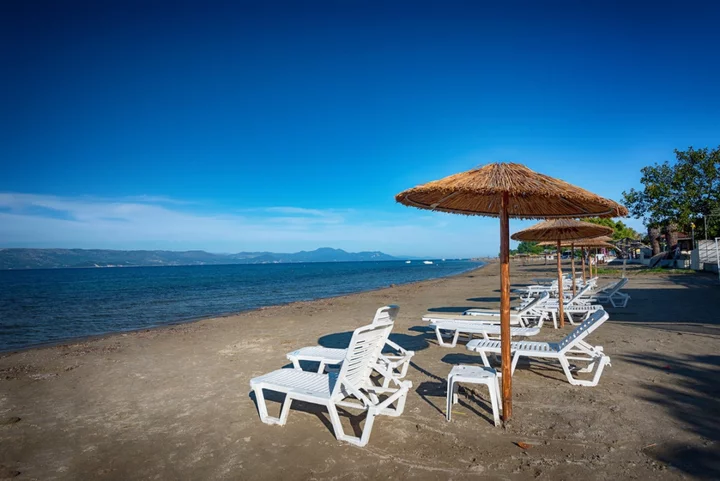
British policewoman, 22, dies ‘falling’ on Corfu holiday
A female police officer has died while on holiday on the Greek island of Corfu. The 22-year-old has not been named but was a serving officer with Surrey Police, and is believed to have been killed in an “accidental fall”. Greek authorities believe the fatal injuries she sustained are compatible with a “low level accidental fall”, the Mirror reports. The Greek town has long been a favourite amongst British tourists. A Surrey Police spokesperson said: “On Friday, 1st September we were sadly made aware of the sudden death of a serving officer whilst they were on holiday in Corfu, Greece. Have you been affected by this incident? If so, email holly.evans@independent.co.uk “We are working to support both their family and their colleagues here during this extremely difficult time. “An investigation into the circumstances of the death is being led by the Greek authorities and we await further updates from them as they conduct their enquiries.” In a statement online, the Surrey Police Federation added: “Devastating news with the confirmation that a 22-year-old Surrey Police officer has died off duty on holiday in Greece. “The officer’s name has not been released and the circumstances into her death on Friday are being investigated. “The thoughts of all at Surrey Police Federation are with the officer’s family, friends and close colleagues at this time. “Both the Federation and the force are supporting them.” More follows on this breaking news story Read More Police must have ‘zero tolerance’ policy to shoplifting Girl, 3, mauled in ‘horrific’ dog attack outside pub suffers serious face injuries as man arrested Fundraising appeal for funeral of toddler hit by vehicle tops £16,000 Fugitive stepmother of girl found dead at home should return to UK, says cousin Man charged in connection with break-in at Chelsea star Raheem Sterling’s home Sara Sharif’s grandfather urges fugitive son to hand himself in
1970-01-01 08:00
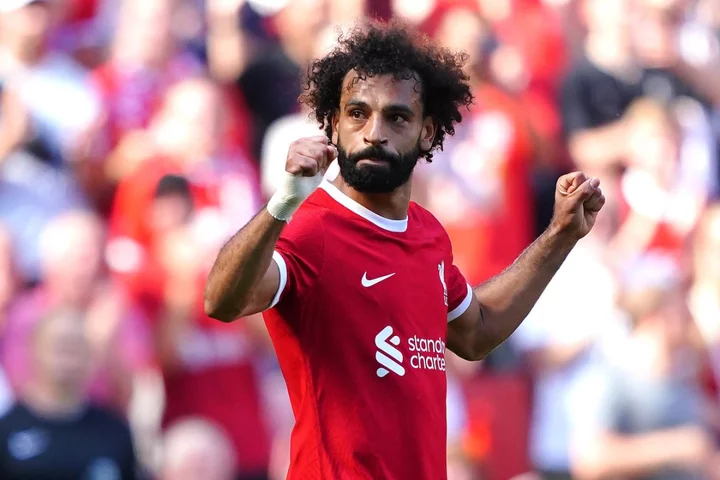
What Mohamed Salah’s dressing room speech says about Liverpool future
Jurgen Klopp hasn’t had a knock on his office door. But Dominik Szoboszlai heard the speech in the dressing room. Mohamed Salah had told his teammates he is staying, the Hungarian reported. The Egyptian, according to his manager, has never come to tell him he was leaving. The German, seeing Salah’s commitment in matches and training, noting his input in meetings of the players’ leadership group, had not felt the need to ask him if his next match would be for Al-Ittihad. “For me it wasn’t a subject for one second, to be honest,” Klopp said. Perhaps only for him. Klopp could brush aside a £150m bid, with a breezy indifference to the prospect of a windfall, because of Salah’s attitude. “I never had any doubt about his commitment to this club,” he said. “You can’t imagine how much fuss the world has made but how calm we are with it. He is our player and wants to play here.” Which, Szoboszlai said, was the message conveyed to the rest of the side. The Saudi Pro League transfer window remains open but Liverpool’s position is unchanging: Salah is not for sale. The 3-0 win over Aston Villa was his latest tour de force, but there were few signs it will prove his last: there was no wave that could be interpreted as a farewell on the pitch afterwards, his hug with Klopp was brief while the manager paid more attention to Jarell Quansah. There was a feel of normality, though these are abnormal times. More than a few would be distracted by the prospect of becoming the best-paid player in the world: not Salah. Other footballers, from Matheus Nunes to Wilfried Gnonto, went on strike towards the end of the window. Salah instead struck against Villa. Such dissent as he has shown this season came at Chelsea on the opening weekend when he contrived to rip a relatively small bandage into several pieces and fling it on the pitch in his annoyance at being substituted. Yet it was all a sign of an enduring ambition: to play, to excel. The signs are that it is to continue at Liverpool. He has propelled himself to greatness in Europe in a way that was not preordained – not for a player from his background, not for a fringe figure at Chelsea – and perhaps he is reluctant to give up his spot at the top table. Saudi Arabia may not be a retirement home for everyone, but it is for some. Salah’s old sidekicks Sadio Mane and Roberto Firmino are there, the Senegalese after a troubled season at Bayern Munich, the Brazilian when his race felt run, but Salah is in the sort of shape to suggest that, even at 31, he is not entering his dotage. Even as Erling Haaland seems to have supplanted him as the annual Golden Boot winner, he may be more creative than before. Perhaps no forward in the Premier League presents such an all-round threat. As the best-paid player in Liverpool’s history, he is scarcely a pauper. Yet, in a time of transition at Anfield, when the side of 2024 may not reach the heights of some of its recent predecessors, it is notable that Salah has given no indications he is going. And this when he had more reasons to decamp to Saudi Arabia than most. The inexplicable element is that Al-Ittihad left their approach so late: as the best Arab footballer on the planet and, along with Karim Benzema, the outstanding Muslim player, Salah is seen as a flagship signing, a long-term target for the league as a whole. But that time may now have to be next summer, if not later. Liverpool will tend to sell anyone when three criteria are met: when the offer is big enough, when the player wants to go and when Klopp has the time to recruit a replacement, should he need one. Al-Ittihad only ticked one of those three boxes and increasing the bid to, say, £200m would not change that. If Klopp, his players and the fanbase who sang about their Egyptian king are in harmony, the most intriguing element of the Liverpool coalition is the owners. Fenway Sports Group traded their way to the top; Liverpool’s rise was financed in part by selling very well. Financial logic dictates that nine-figure sums for players in their thirties must be accepted. The case for keeping Salah is partly footballing, partly fiscal, given the value of Champions League qualification, partly a case of morale and status and keeping Klopp happy. But taking £40m for Fabinho, who seemed an old 29 last season, represented the kind of offer they were otherwise unlikely to get; £12m for a 33-year-old Jordan Henderson definitely was. Taking £150m for Salah, who could leave on a free transfer in 2025, might have seemed a no-brainer. But it would also be accepting defeat; for Liverpool but maybe for Salah, too. Read More Jurgen Klopp gives update on Mohamed Salah Saudi Arabia transfer As Saudi clubs prepare world-record bid, Mohamed Salah shows his true value to Liverpool Liverpool reinvented as midfield shuffle hints at Jurgen Klopp’s past Andy Robertson expects Mohamed Salah to stay at Liverpool despite Saudi interest Jurgen Klopp: Liverpool’s stance on keeping hold of Mohamed Salah will not waver Jurgen Klopp gives update on Mohamed Salah Saudi Arabia transfer
1970-01-01 08:00
